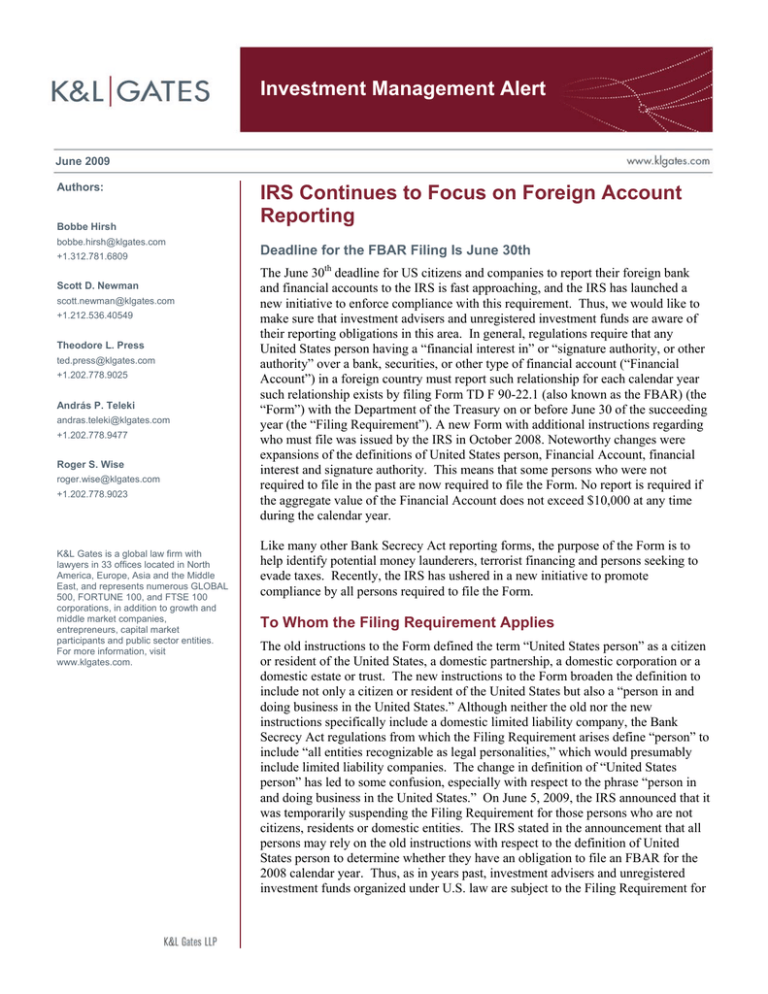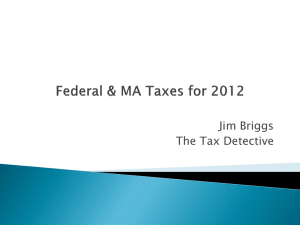
Investment Management Alert
June 2009
Authors:
Bobbe Hirsh
bobbe.hirsh@klgates.com
+1.312.781.6809
Scott D. Newman
scott.newman@klgates.com
+1.212.536.40549
Theodore L. Press
ted.press@klgates.com
+1.202.778.9025
András P. Teleki
andras.teleki@klgates.com
+1.202.778.9477
Roger S. Wise
roger.wise@klgates.com
+1.202.778.9023
K&L Gates is a global law firm with
lawyers in 33 offices located in North
America, Europe, Asia and the Middle
East, and represents numerous GLOBAL
500, FORTUNE 100, and FTSE 100
corporations, in addition to growth and
middle market companies,
entrepreneurs, capital market
participants and public sector entities.
For more information, visit
www.klgates.com.
IRS Continues to Focus on Foreign Account
Reporting
Deadline for the FBAR Filing Is June 30th
The June 30th deadline for US citizens and companies to report their foreign bank
and financial accounts to the IRS is fast approaching, and the IRS has launched a
new initiative to enforce compliance with this requirement. Thus, we would like to
make sure that investment advisers and unregistered investment funds are aware of
their reporting obligations in this area. In general, regulations require that any
United States person having a “financial interest in” or “signature authority, or other
authority” over a bank, securities, or other type of financial account (“Financial
Account”) in a foreign country must report such relationship for each calendar year
such relationship exists by filing Form TD F 90-22.1 (also known as the FBAR) (the
“Form”) with the Department of the Treasury on or before June 30 of the succeeding
year (the “Filing Requirement”). A new Form with additional instructions regarding
who must file was issued by the IRS in October 2008. Noteworthy changes were
expansions of the definitions of United States person, Financial Account, financial
interest and signature authority. This means that some persons who were not
required to file in the past are now required to file the Form. No report is required if
the aggregate value of the Financial Account does not exceed $10,000 at any time
during the calendar year.
Like many other Bank Secrecy Act reporting forms, the purpose of the Form is to
help identify potential money launderers, terrorist financing and persons seeking to
evade taxes. Recently, the IRS has ushered in a new initiative to promote
compliance by all persons required to file the Form.
To Whom the Filing Requirement Applies
The old instructions to the Form defined the term “United States person” as a citizen
or resident of the United States, a domestic partnership, a domestic corporation or a
domestic estate or trust. The new instructions to the Form broaden the definition to
include not only a citizen or resident of the United States but also a “person in and
doing business in the United States.” Although neither the old nor the new
instructions specifically include a domestic limited liability company, the Bank
Secrecy Act regulations from which the Filing Requirement arises define “person” to
include “all entities recognizable as legal personalities,” which would presumably
include limited liability companies. The change in definition of “United States
person” has led to some confusion, especially with respect to the phrase “person in
and doing business in the United States.” On June 5, 2009, the IRS announced that it
was temporarily suspending the Filing Requirement for those persons who are not
citizens, residents or domestic entities. The IRS stated in the announcement that all
persons may rely on the old instructions with respect to the definition of United
States person to determine whether they have an obligation to file an FBAR for the
2008 calendar year. Thus, as in years past, investment advisers and unregistered
investment funds organized under U.S. law are subject to the Filing Requirement for
Investment Management Alert
the 2008 calendar year generally only if they have a
“financial interest in” or “signature authority or
other authority” over a foreign Financial Account.
How to Determine Whether the Filing
is Required
Given the approaching June 30th deadline, as well as
the severe civil and criminal penalties for even
unintentional failure to file, investment advisers and
unregistered investment funds should review their
foreign Financial Account relationships to determine
whether they must file the Form. Such a review
should begin with determining whether the
investment adviser or unregistered investment fund
has a “financial interest” in or “signature authority,
or other authority” over a Financial Account in a
foreign country (a foreign country includes all
geographical areas located outside the United States,
Guam, Puerto Rico, U.S. Virgin Islands, and other
U.S. territories).
What Qualifies as a “Financial
Account”?
Financial Accounts generally include any bank,
securities, securities derivatives or other financial
instruments accounts. The instructions to the Form
state that Financial Accounts “generally also
encompass any accounts in which the assets are held
in a commingled fund, and the account owner holds
an equity interest in the fund.” Mutual funds were
added as an example to the definition of “Financial
Account” in the new instructions. Based on the
foregoing, unregistered investment funds organized
under U.S. law that invest in an offshore fund such
as in a master-feeder structure would generally be
required to file the Form.
What is a “Financial Interest”?
According to the instructions to the Form, a United
States person has a “financial interest” in each
account for which:
1. such person is the owner of record or has legal
title, whether the account is maintained for his
or her own benefit or for the benefit of others
including non-United States persons. If an
account is maintained in the name of two
persons jointly, or if several persons each own a
partial interest in an account, each of those
United States persons has a financial interest in
that account; or
2. the owner of record or holder of legal title is: (i)
a person acting as an agent, nominee, attorney,
or in some other capacity on behalf of the
United States person; (ii) a corporation in which
the United States person owns directly or
indirectly more than 50 percent of the total
value of shares of stock; (iii) a partnership in
which the United States person owns an interest
in more than 50 percent of the profits
(distributive share of income); or (iv) a trust in
which the United States person either has a
present beneficial interest in more than 50
percent of the assets or from which such person
receives more than 50 percent of the current
income; or
3. a trust, or a person acting on behalf of a trust,
that was established by the United States person
and for which a trust protector has been
appointed. A trust protector is a person who is
responsible for monitoring the activities of a
trustee, with the authority to influence the
decisions of the trustee. This item was added to
the new instructions in the fall of 2008.
Who has “Signature Authority, or
Other Authority” Over a Financial
Account?
Instructions to the Form state that a person has
“signature authority” over a Financial Account if
such person can control the disposition of money or
other property in it by delivery of a document
containing his or her signature (or his or her
signature and that of one or more other persons) to
the bank or other person with whom the account is
maintained. “Other authority” exists in a person
who can exercise comparable power over an
account by direct communication to the bank or
other person with whom the account is maintained,
either orally or by some other means (e.g., e-mail).
The new instructions add to the definition of “other
authority” power over an account by indirect
communication through “an agent, nominee,
attorney, or in some other capacity on behalf of the
U.S. person.” Therefore, it would be prudent to
review the adviser’s prime brokerage agreement as
well as any other agreements related to any foreign
Financial Accounts to determine which employees
June 2009
2
Investment Management Alert
and perhaps entities have authority to move monies
or securities into and out of existing foreign
Financial Accounts either directly or indirectly.
their U.S. investors to seek guidance about the
possible applicability of the foreign account
reporting requirements to them.
What the Filing Requirement Means in
Practice for U.S. Advisers.
What if Reports were Due but not Filed
in the Past?
Typically U.S. advisers do not have financial
interests in foreign Financial Accounts based on the
definition of “financial interest” because (i) it is the
unregistered investment fund that owns the assets,
including any foreign Financial Accounts, and (ii)
profit participation in the unregistered investment
fund is typically less than 50 percent. However,
individuals who have “signature authority” over an
offshore account may have a filing requirement,
with certain limited exceptions listed in the
instructions. In addition, U.S. investors investing
directly or indirectly in an offshore fund, and certain
of their officers or employees, may also have a filing
requirement, and U.S. advisers may want to alert
Penalties for failure to file the Form can be severe.
The IRS has announced a “voluntary disclosure”
program. No penalties will be imposed for the
failure to file the Form in prior years if the late
Forms are filed, along with a statement explaining
why the Forms are being filed late, with the IRS by
September 23, 2009, at the following address:
Internal Revenue Service
11501 Roosevelt Blvd.
South Bldg., Room 2002
Philadelphia, PA 19154
Attn: Charlie Judge, Offshore Unit, DP S-611
June 2009
3
Investment Management Alert
The following examples illustrate situations in which an investment adviser or unregistered investment
company fund generally will and will not be required to file the Form.
Common Examples
Situation
A domestic fund has an
offshore bank or
brokerage account
An offshore fund has an
offshore bank or
brokerage account
A domestic fund invests
in an offshore fund
An offshore fund in
which a domestic fund
invests
A principal or
employee of an
investment fund has
signature authority over
an offshore bank or
brokerage account
A principal or
employee of an
investment fund who
has authority to direct
an offshore
administrator to move
monies or securities in
an offshore account
held at a different entity
Filing Required (Yes/No)
Yes
Rationale
The fund has a financial interest in a foreign
bank or securities account.
No
The offshore fund is not a United States
person.
Yes
The offshore fund appears to satisfy the
definition of Financial Account as a
“commingled fund.”
The offshore fund is not a United States
person.
No
Yes
If an individual has signature authority, the
individual would be required to file.
Yes
Under the new instructions regarding
signature authority, “other authority” exists
in indirect as well as direct communications.
A number of interpretative questions arise in connection with the completion of the Form. Therefore, please
contact us or your tax preparer if you have any questions regarding the Filing Requirement, whether you are
required to file the Form, or if you need help completing the Form.
IRS Circular 230 Notice
To ensure compliance with requirements imposed by the IRS, we inform you that any U.S. federal tax
advice contained in this communication (including any attachments) is not intended or written to be used,
and cannot be used, for the purpose of (1) avoiding penalties under the Code or (2) promoting, marketing, or
recommending to another party any transaction or matter addressed herein.
June 2009
4
Investment Management Alert
Anchorage Austin Beijing Berlin Boston Charlotte Chicago Dallas Dubai Fort Worth Frankfurt Harrisburg Hong Kong London
Los Angeles Miami Newark New York Orange County Palo Alto Paris Pittsburgh Portland Raleigh Research Triangle Park
San Diego San Francisco Seattle Shanghai Singapore Spokane/Coeur d’Alene Taipei Washington, D.C.
K&L Gates is a global law firm with lawyers in 33 offices located in North America, Europe, Asia and the Middle East, and represents numerous
GLOBAL 500, FORTUNE 100, and FTSE 100 corporations, in addition to growth and middle market companies, entrepreneurs, capital market
participants and public sector entities. For more information, visit www.klgates.com.
K&L Gates comprises multiple affiliated partnerships: a limited liability partnership with the full name K&L Gates LLP qualified in Delaware and
maintaining offices throughout the U.S., in Berlin and Frankfurt, Germany, in Beijing (K&L Gates LLP Beijing Representative Office), in Dubai,
U.A.E., in Shanghai (K&L Gates LLP Shanghai Representative Office), and in Singapore (K&L Gates LLP Singapore Representative Office); a
limited liability partnership (also named K&L Gates LLP) incorporated in England and maintaining offices in London and Paris; a Taiwan general
partnership (K&L Gates) maintaining an office in Taipei; and a Hong Kong general partnership (K&L Gates, Solicitors) maintaining an office in Hong
Kong. K&L Gates maintains appropriate registrations in the jurisdictions in which its offices are located. A list of the partners in each entity is
available for inspection at any K&L Gates office.
This publication is for informational purposes and does not contain or convey legal advice. The information herein should not be used or relied upon
in regard to any particular facts or circumstances without first consulting a lawyer.
©2009 K&L Gates LLP. All Rights Reserved.
June 2009
5




